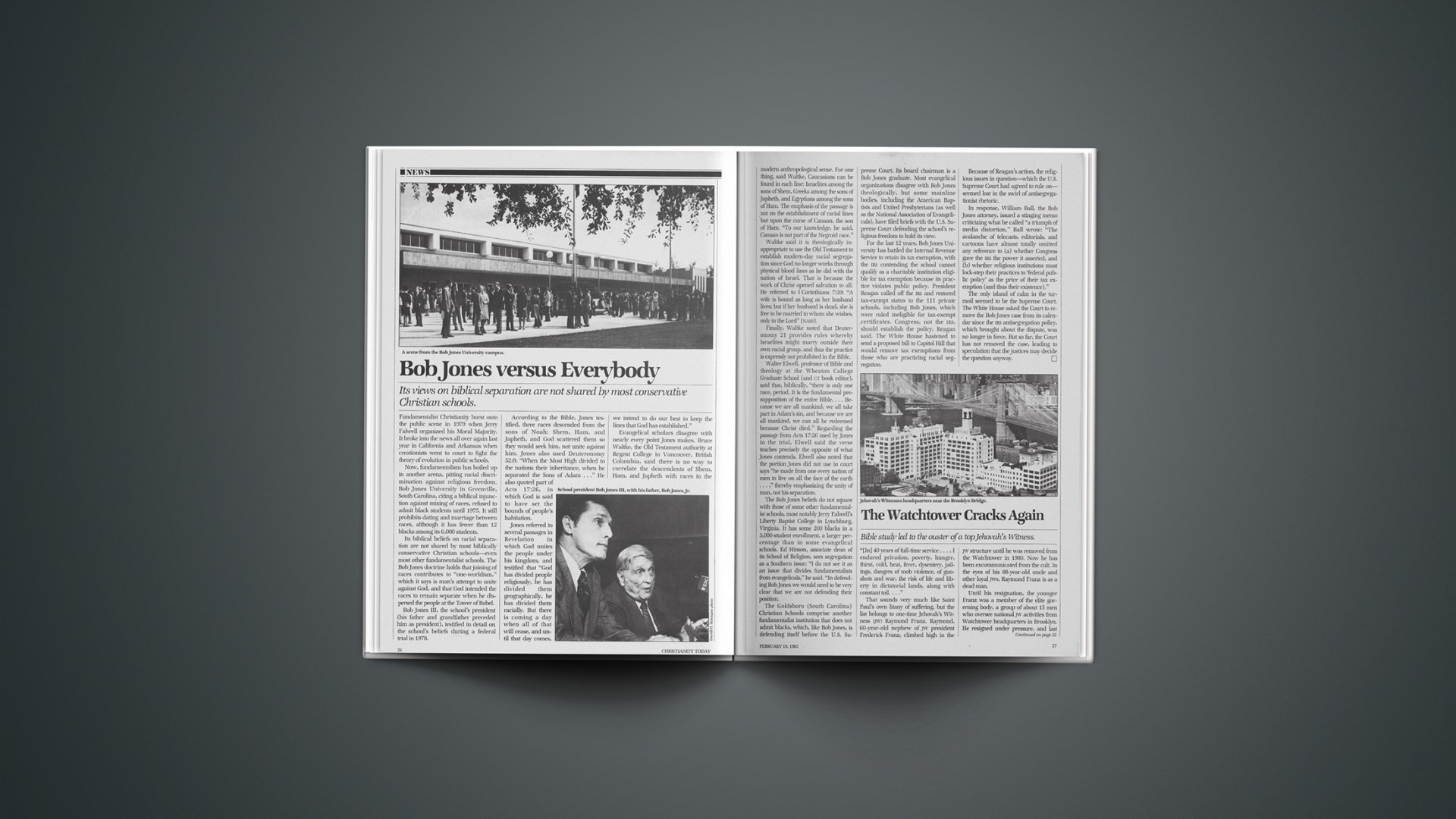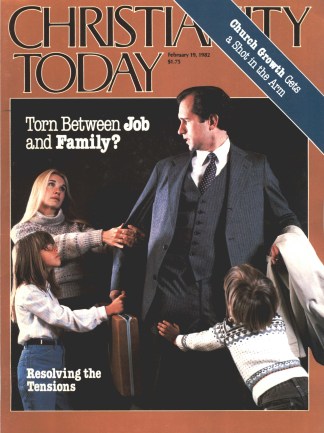Bible study led to the ouster of a top Jehovah’s Witness.
“[In] 40 years of full-time service …, I endured privation, poverty, hunger, thirst, cold, heat, fever, dysentery, jailings, dangers of mob violence, of gunshots and war, the risk of life and liberty in dictatorial lands, along with constant toil.…”
That sounds very much like Saint Paul’s own litany of suffering, but the list belongs to one-time Jehovah’s Witness (JW) Raymond Franz. Raymond, 60-year-old nephew of JW president Frederick Franz, climbed high in the JW structure until he was removed from the Watchtower in 1980. Now he has been excommunicated from the cult. In the eyes of his 88-year-old uncle and other loyal JWS, Raymond Franz is as a dead man.
Until his resignation, the younger Franz was a member of the elite governing body, a group of about 15 men who oversee national JW activities from Watchtower headquarters in Brooklyn. He resigned under pressure, and last December 31 Franz was disfellowshiped (the JW term for excommunication). The premise for the disfellowshiping was that Ray Franz had dined with a man who left the cult only months before.
Franz does not deny that he had dinner at a Gadsden, Alabama, steak house with Peter Gregerson. But Gregerson, who disassociated himself from the cult after having been a JW since the age of three, is Franz’s landlord and employer. Franz thinks it is difficult not to talk to (or eat with) the man who is your boss and who owns the land on which you live.
After his resignation from the governing body in 1980, Franz was mute. He chose not to comment on any of the problems he had with the cult (CT, Dec. 12, 1980, p. 68). But the recent disfellowshiping has spurred Franz and his friends to tell more of his story.
Raymond Franz graduated from high school in 1940, and the same month went to the mission field to win converts for Jehovah God. He served in Puerto Rico and the Dominican Republic. He once visited a Kentucky coal mining camp with other JW missionaries and was told to leave the camp. When he persisted, Franz was shot at.
After more than 20 years of arduous service, Franz went to Brooklyn and began work on the Aid to Bible Understanding. The encyclopedic Aid is the authoritative JW commentary on what the Bible means. Ray Franz was considered one of the best Bible scholars in Brooklyn and worked on the Aid with four other men.
Writing the Aid drove Franz closer to the Bible and he was haunted by the theme of grace—a theme incongruous with the typically legalistic emphasis of the cult. (Ironically, Franz and two others who wrote “about 80 percent” of the Aid have since been disfellowshiped. Although it has since been revised, it substantially remains a book written by the three men who are no longer JWS.)
By 1971, Franz was elected a member of the prestigious governing body. The reasons for his pressured resignation nine years later remain unclear. Franz and his uncle Frederick, JW president, reportedly were on poor terms (though Raymond will not comment on this). His doctrinal conclusions may also have disturbed other members of the governing body. Political bones of contention included a 1975 shift in the power structure, which Ray Franz supported and his uncle opposed.
He was 58 when he left the Watchtower, untrained in other labor, and without finances. He also had heart problems. It was then that Peter Gregerson, a long-time friend, offered Franz some living space on his Alabama farm. Franz moved near Gadsden and lived in a house trailer, farming and doing odd jobs for Gregerson, and he continued to worship at the Gadsden Kingdom Hall.
By late December Franz was disfellowshiped. The elders said he had violated a pronouncement of the September 15, 1981, Watchtower magazine, which forbade speaking to or dining with a disassociated JW. In Franz’s case, the disassociated JW was Gregerson.
Two years ago, while still a Witness, Gregerson was promoted in his company, Warehouse Groceries, a chain of 10 stores in northeastern Alabama. This gave Gregerson time to read Scripture (many former JWS report their problems with JW authorities began when they started studying the Bible on their own). Despite the fact that all of Gregerson’s family and friends were Witnesses, he “came to the conclusion that what I had been believing all my life was not true.” He resigned from the cult. Franz now works full-time under Gregerson at Warehouse Groceries, as do at least 35 JWS. Though the other Witnesses necessarily speak to Gregerson on occasion (and even eat with him, Franz says), only Franz was disfellowshiped.
Franz appealed his disfellowshiping but withdrew his appeal when he learned who would sit on the appeal committee. One man had been embarrassed by Gregerson years before when Gregerson challenged his handling of a matter before higher JW officials. Another, Earl Parnell, was the father-in-law of Gregerson’s daughter until the marriage ended in bitter divorce. The third was Earl Parnell’s son-in-law.
Spokesmen in Watchtower headquarters say the national officials had nothing to do with Franz’s excommunication. A Gadsden elder says the disfellowshiping concerned “strictly the congregation here. The governing body has nothing to do with it.”
Gregerson considers that claim “laughable.” He believes the elders were in contact with Brooklyn, and the JW elite may have initiated the excommunication. He wrote Brooklyn several times to protest the Gadsden proceedings but never received a reply. In addition, a traveling overseer had questioned Franz at length about his beliefs.
Raymond Franz will not say if he remains a Witness. A series of letters to the committee that eventually turned him out portrays a man seriously wrestling with Scripture and finally proclaiming, Luther-like, “I assure you that if you will help me to see from the Scriptures that the act of eating with Peter Gregerson is a sin, I will humbly repent of such sin before God.” It is a smaller stage, perhaps, than Luther’s or Wesley’s, but the Bible continues to cause men to stand alone and suffer the consequences.










